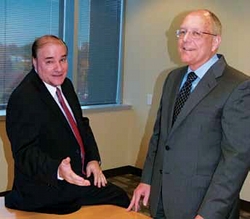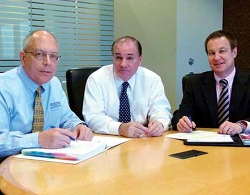by Richard Stukey — Today’s facilities operations and maintenance professionals have a host of complicated topics to take into consideration. In the past, many of these issues, if they existed at all, were only minor considerations at the time: energy and resource efficiency; advanced real-time building automation controls; defending the operations budget; energy efficiency in air filtration systems; water efficiency and green water treatment methods; high efficiency lighting; and safety and security issues (not just how well the locks work, but learning about the latest security cameras and iris scanners).

While many of these topics may have been on the minds of facilities professionals 20 years ago, it was much simpler before “high performance building” became the keywords of the industry. It wasn’t until the year 2000 that the U.S. Green Building Council developed its LEED® (Leadership in Energy and Environmental Design) building certification program, and despite recent popularity, LEED certified buildings represent only a fraction of the buildings our members maintain. Yet because of the popularity of LEED certified and other high performance buildings, AFE members are clamoring for new certification programs and webinars with building efficiency as the main topic. But it is not the just the relatively few facilities professionals operating LEED buildings who are clamoring for more education and training in new buildings systems. Existing buildings make up the largest percentage of buildings — particularly as new construction has slowed along with the economy. However, the slow economy has not been a deterrent for many owners of older, existing buildings to replace the HVAC systems, roofing, lighting, and computerized building information systems with more energy. In addition, cost-efficient systems often require advanced training even for facilities operators and engineers with decades in the profession.
Meet the AFE Board Chair: Wayne P. Saya, CPE

As a Certified Plant Engineer, Wayne Saya has been a member of AFE when it possessed the trade name of AIPE (American Institute of Plant Engineers), and enters the chairmanship as AFE’s vice chair and treasurer. As a nationally recognized member of our organization, Saya has been the past Boston chapter president and New England regional vice president. Saya is also an instructor for AFE’s Plant Engineer (CPE) and Plant Maintenance Management (CPMM) certification programs.
In 2007, Saya founded the Corporate Relations Council — an AFE sponsored international roundtable of who’s who in the facilities maintenance and engineering industry, and designed to set the annual AFE agenda.
Saya is the director of Energy & Sustainability for UGL Services in North America and Unicco Government Services – with over 30 years of facilities engineering and energy management experience. While in his twenties as part of the research & development project sponsored by the Department of Electrical Engineering at the Massachusetts Institute of Technology, Saya designed and patented one of the country’s first wireless jam-proof technologies for satellite use of alarm systems and transmitting devices, and is currently a member of the United Inventors Association.
Saya is currently a member of the High-Performance Building Congressional Caucus Coalition (HPBCCC), a private sector coalition providing guidance and support to the High-Performance Buildings Caucus of the U.S. Congress.
As an engineering director for the Ritz-Carlton hotel company, Saya was the principal author of the company’s energy management plan, used for the 1992 Malcolm Baldrige Quality Award, and a member of their hotel opening team for the Aspen, Colorado, Dearborn, Michigan, and Barcelona, Spain properties.
In 2006, Saya was recognized by the National Air Filtration Association as the 2005 National Clean Air Award recipient, while managing the Boston Massachusetts Medical & Veterinarian campus of Tufts University for five years.
In 2008, Wayne set-up the ‘real-time’ energy tracking & trending program for the Government Accountability Office in Washington, DC; recognized as first in the country’s ‘real-time’ energy program for a U.S. government building. Saya has also set-up similar programs for the 3.8 million-square-foot facilities of the International Monetary Fund, also in Washington, DC, and at the largest Internal Revenue Service (IRS) facility in the country in Martinsburg, West Virginia.
Licensed in the Commonwealth of Massachusetts for the installation and repair of HVAC systems, Saya resides with his wife Nancy and family in Nashua, New Hampshire. He can be located on LinkedIn and Facebook.
To meet the challenge of helping its members operate the new high performance buildings — or simply to operate existing buildings more efficiently and cost-effectively — AFE knew that it needed to reach as many professionals as possible with resources that were relevant to their jobs and their profession.
In the past year, AFE Certification programs saw a more than 50 percent increase over 2010. “AFE Certification continues to grow because we focus on the information and skill that members need and want,” noted AFE’s Executive Director Dr. Wayne Carley. “Since most of our members are ‘building generalists’ who manage the entire building ‘from the boiler room to the board room,’ our programs provide knowledge about every aspect of building operation, including HVAC systems, roofing, lighting, computerized building information systems, and how to effectively supervise and work with other building operations professionals,” he said.
For the same reasons that AFE Certification and education programs became so popular in the United States, they also gained increasing popularity outside the United States. Facilities professionals and engineers from countries like Korea, Japan, Abu Dhabi, Mexico, Canada and others began taking AFE Certification Review Courses; both online and live courses taught in the United States.
Major multinational corporations in the building services industry also took notice. Many of those companies have begun making AFE Certification one of the mainstays of their training programs. Hundreds of building operations and maintenance professionals from CB Richard Ellis, Aramark, EMCOR and UGL Services have completed the programs, and many more sign up each day. The worldwide reach of these companies means an even greater global presence for AFE.
AFE: Helping the Facilities Professional In Peoria, Paris and Seoul
So how will expanding the vision to international cities like Paris, Seoul or Tokyo help the facilities professional in Peoria?
“Today’s highly technical global economy is changing the way the profession works,” Carley said. “It may seem trite, but it is also true that we have become a global economy. A building in Dubai is likely to be built and managed by people from all over the world — with money from all over the world. In this tightly knit global economy, it is incumbent on AFE to serve the global facilities engineering community both because it is the mission of AFE to serve facilities professionals throughout the world — and because a global presence gives our people to these opportunities in the global economy.”
One of Carley’s visions for AFE over the next five years is to foster a “global leadership role in future of facilities maintenance and operations” that will help members in Peoria as well as Shanghai because of the shared knowledge and experience that will result. “This is no longer an option, but a necessity,” he added. “Think about it: the biggest and most interesting buildings are not being built in the United States. They are being built in places like China, Singapore and Dubai, where real growth is taking place. There is going to be a tremendous need for well-trained facilities engineers in these places, and well as for new building systems that our industry partners provide — things like HVAC systems, roofing and fenestration, and building automation systems.”

AFE’s most challenging certification program, the Certified Plant Engineer (CPE), has become extremely popular among facilities engineering and operations professionals in South Korea, where building construction has blossomed along with the economy. For the past several years, hundreds of members of the Korean Institute of Plant Engineering and Construction have taken the CPE exam. “They have told us that they like the challenge of the CPE exam,” noted Dr. Wayne Carley, AFE’s executive director.
Facilities Engineers: Creating a Better World
For the past year — since he took over at the helm of AFE — Carley has used his decades of experience as executive director of the National Association of Biology Teachers and as a university professor, to formulate a strategy designed to heighten AFE’s presence in Asia, Australia, Southeast Asia, Europe and the Middle East. The strategy will ultimately expand AFE’s educational, certification and networking programs in these regions, and result in facilities professionals from around the world being able to share new ideas and technologies.
“Our international members have told us the some other facilities organizations act as though maintaining or operating a building in another country is the same as operating a building here in the United States,” he said. “But we know that is not true. Regulations and standards are different throughout the world, and we have to take that into account when we offer education and certification programs in other countries,” he said. “But we also have to remember that there is an opportunity for AFE to help our members share different ideas and technology.”
Carley’s interest in expanding AFE’s reach also has to do with his concern for the global environment and global warming. “By helping members throughout the world operate their buildings more efficiently, we are also helping the global environment remain safe for generations to come,” he said. “As world economies grow, those countries are also catching up to the United States in energy consumption — and a corresponding amount of carbon pollution.” Carley cited statistics from the United States Department of Energy showing that building energy consumption in 2008 was up about 50 percent over consumption in 1980.
2011—A Year of ‘Great Successes’ for AFE
Building a ‘global agenda’ was one of the most important accomplishments of AFE in 2011, helping our current members enjoy many of the opportunities and building technologies from countries around the globe. But as Carley noted as he rounds out his first year as the organization’s executive director, 2011 was a year of ‘great successes for AFE.’ Those successes include:
- Maintaining outstanding customer service levels
- Partnered with the Association of Energy Engineers (AEE) to develop the first in the nation educational program to certify government building operators in high performance building maintenance (GOHP).
- Increased attendance at Facilities America and expanded participation leadership meetings.
- Formation of the Leadership Development Institute to train AFE’s current and future leaders.
- Expanded the size of our corporate offices while increasing our corporate staff by nearly 30 percent (over 2010) to respond more quickly and completely to customer requests.
- Increased Facilities Engineering Journal advertising revenue by nearly 75 percent in January 2012 (compared to January 2011).
- Signed major new corporate sponsor (IDEAL Industries) and renewed more than 80 percent of current corporate sponsors and Global Technical Partners.
- Improved webinar program with new technology, and more relevant topics to help generate higher attendance.
- New computers to help improve employee productivity.
- Increased number of “Legislative Alerts” to make members aware of legislation initiative in Washington D.C. that could have an impact on the facilities profession throughout the country.
- Participated on Capital Hill (Washington, DC) as a major contributor and partner with the Federal Buildings Personnel Training Act (FBPTA) of 2010.
- More than doubled 2011 profit projections
- Significantly increased the number of executive level meetings with Fortune 500 companies.
Support for Global Agenda
Carley received the strong backing of AFE leadership in “going global” with its education and certification programs when Wayne P. Saya, director of Energy & Sustainability for UGL Services North America, was elected AFE’s board chair last year. In his role at UGL, Saya has seen the difficulties caused by pollution both in the United States and in other parts of the world. His corporate and personal commitment has led him to become a strong advocate and partner in AFE’s effort to improve the professional results of members while helping to improve the global environment.

“As a former biology teacher, Dr. Carley understands the extreme importance of a worldwide approach to energy efficiency and reducing pollution,” Saya said. “This is true whether it be carbon or other types of industrial pollution. Improving energy efficiency in buildings is one of those most important ways to improve the environment.”
Both Carley and Saya noted the popularity of AFE’s Certified Plant Engineer program among Koreans. Drawn by AFE’s worldwide reputation, a delegation of several dozen members of the Korean Institute of Plant Engineering and Construction (KIPEC) recently came to the United States from Seoul, Korea to become AFE Certified. Additional members of KIPEC are scheduled to take the Certified Plant Engineer exam in the near future.
Carley received strong support from Saya, whose position at UGL Services makes him well versed in all aspects of buildings operations. While efforts to conserve energy helped limit U.S. consumption to one half of one percent between 2002 and 2008, China’s energy demand almost doubled over the same period, according the U.S. Department of Energy’s Buildings Energy Data Book. The same report noted that China consumed the second largest amount of primary energy (85.1 quads), produced the largest share of carbon dioxide emissions in the world.
Carley strongly believes that these statistics underscore how important it is for AFE to promote its programs throughout the world. “AFE acts as an information-sharing resource for all of the new products and services now available to professionals, who maintain, operate and manage buildings and other facilities throughout the world,” he said. “It is through our webinars, education sessions at trade shows, facilities tours, or our education and certification programs, we strive to be continually at the forefront of the worldwide revolution in building maintenance and operations. By reaching out to the facilities professionals throughout the world, AFE can help our members whether they are from Paris, Shanghai —or Peoria.”
Richard Stukey is senior editor of the Facilties Engineering Journal and business development director for the Association for Facilities Engineering.